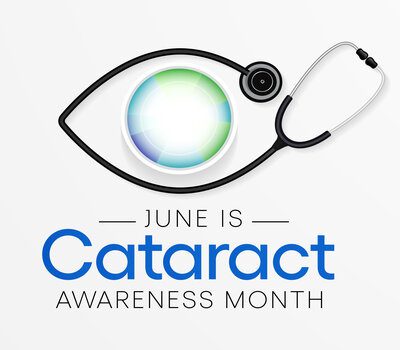Search by Color or Cause


June is Cataract Awareness Month. Cataracts are a vision-worsening condition that occurs around age 40. This is when proteins in the eye lens begin to break down. They also clump and form a cloudy area over time. Cataracts affect 70 percent of adults by age 75. Recent CDC data indicate more than 17% of adults above age 40 have a cataract in one or both eyes. The awareness color for cataract awareness is blue. Wear a blue enamel awareness ribbon pin, blue fabric ribbon, or blue silicone awareness wristband bracelet to recognize this awareness month.
Cataracts cannot be naturally prevented from forming. Research has shown, however, that lifestyle and health behavior influence when and how early a cataract starts to form. The American Association of Ophthalmology (AAO) overviews several key areas of behavioral practice for aging adults to be aware of to lower risks. You can lower risk for and/or delay development of cataracts.
Risk factors linked to early development and quicker progression of cataracts include excessive sunlight exposure. Other factors include smoking and long-term use of steroid medication. Medical conditions linked to higher risk include diabetes, obesity, high blood pressure, and prior eye surgery or eye injuries. Your eye specialist can evaluate your risk for developing cataracts and other age-related eye diseases.
A healthy diet may reduce risk of and/or delay formation and progression of cataracts. Research suggests that a diet high in vitamin C-rich foods helps reduce or delay formation. These include citrus foods including oranges, kiwi, lemon, and grapefruit. Other good suggestions are bell peppers, strawberries, tomatoes, and cruciferous vegetables (broccoli, Brussels sprouts, cabbage, cauliflower). These are helpful in slowing the progression of cataracts. More importantly, adopting good nutrition is a cornerstone of optimizing health early in life and can greatly reduce the risk of developing age-related, vision-worsening conditions like cataracts.
By age 40, all asymptomatic adults should visit an eye specialist for a comprehensive eye exam . The specialists screen for early-stage cataracts and other age-related eye diseases that are leading causes of blindness and low vision. By age 65, a routine eye exam is recommended every year. In most cases this is done to diagnose cataracts that are progressively clouding the lens.
Multiple factors are at play that increase our risk for developing a degenerative eye disease or vision compromising condition as we age. If an individual lives long enough, then cataract formation is unavoidable. Living a healthy lifestyle, however, greatly improves an adult’s odds of avoiding early onset, faster progression, or possibly avoiding the need for cataract surgery in the future.
The most common symptoms of a cataract are:
These symptoms also can be a sign of other eye problems. If you have any of these symptoms, check with your eye care professional.
To learn more about degenerative and vision-worsening eye diseases that affect senior adults, visit the AAO’s Eye Health Information for Adults Over 65.